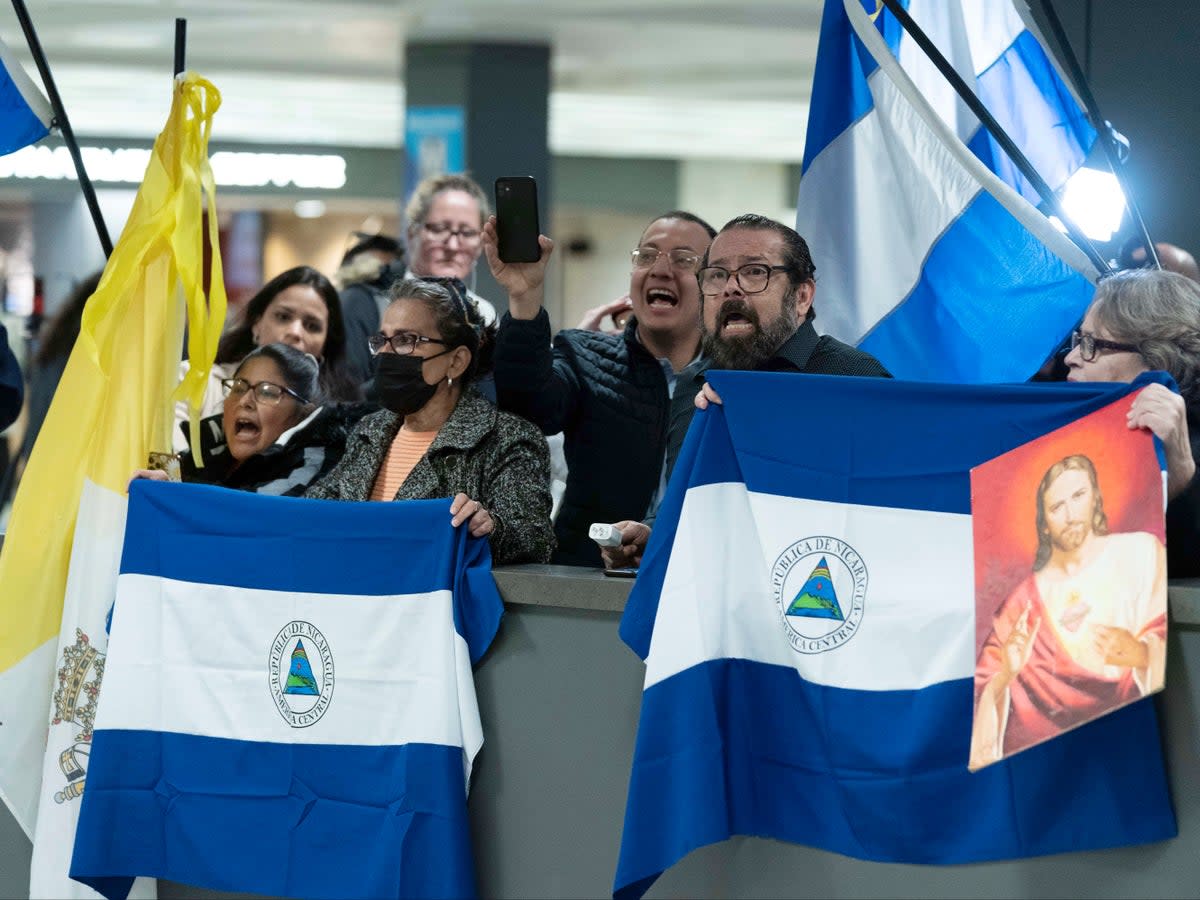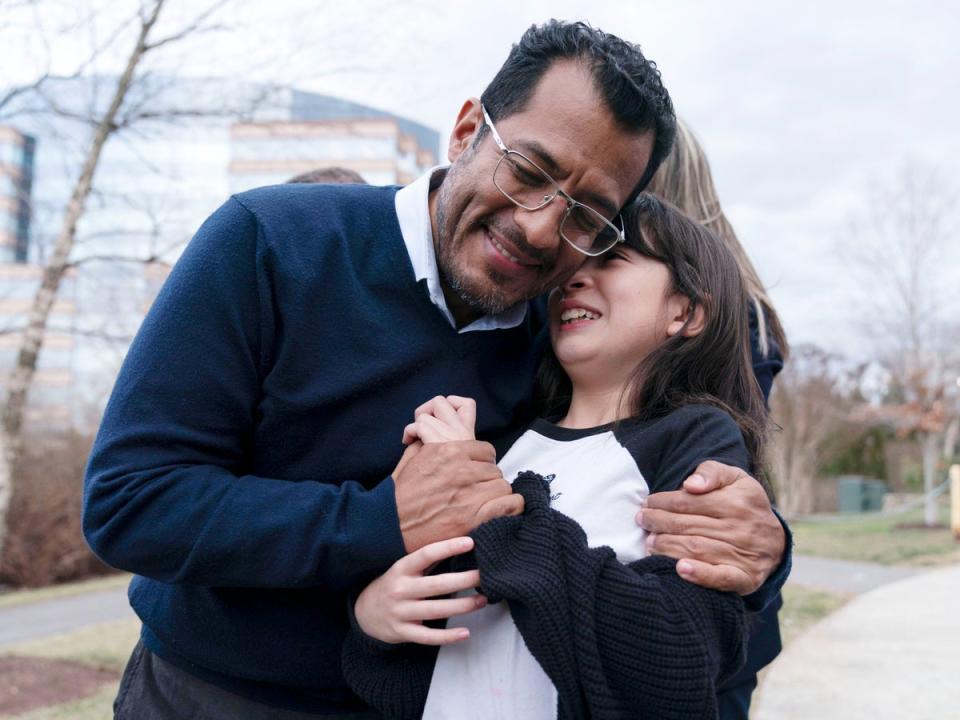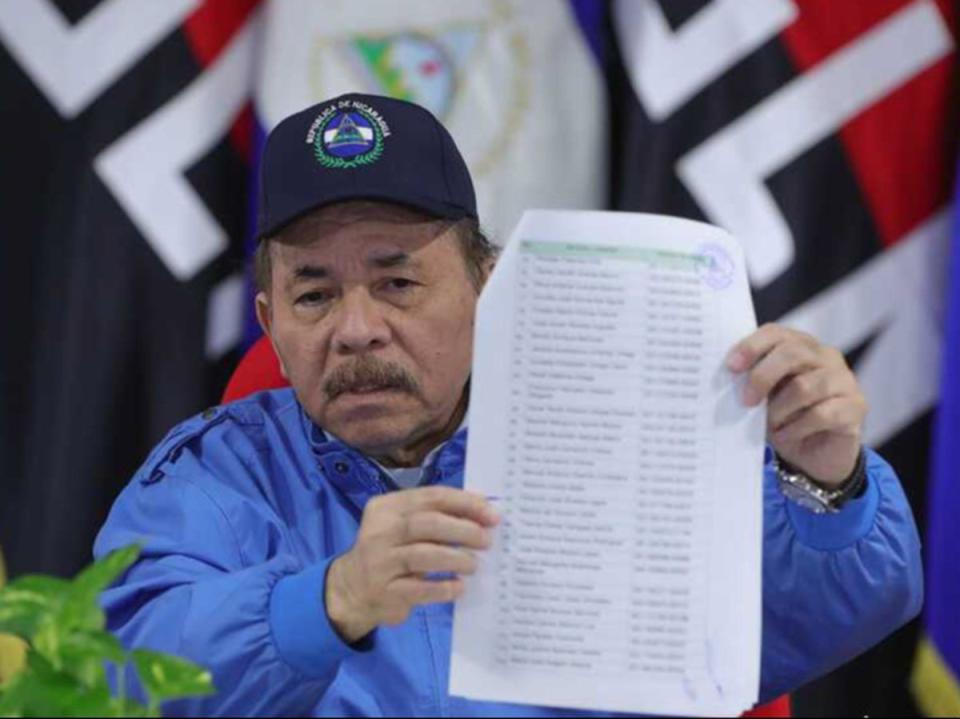Why has Nicaragua suddenly released more than 200 political prisoners?

- Oops!Something went wrong.Please try again later.
- Oops!Something went wrong.Please try again later.
Nicaragua has unexpectedly moved to release 222 of the 245 political prisoners it has been holding in custody, stripping them of their nationality and flying them to the US.
They were subsequently placed on a US-funded flight bound for Dulles International Airport in Virginia, near Washington, DC, where they will be offered medical and legal assistance and met with resettlement aid on emergency humanitarian grounds.
Two other prisoners were due to be released, including Catholic Bishop Rolando Alvarez, a prominent critic of the increasing authortarianism of President Daniel Ortega’s government. However, they refused to board a flight to the US. Bishop Alvarez has been accused of "conspiracy and spreading false news"in what has been labelled a politically motivated act.
Bishop Alvarez is said to have refused to take a plane to the US with those who were freed saying: "Let them go free, I will pay their sentence". Catholic Church sources told El Pais that Bishop Alvarez had been removed from the building where he was under house arrest and taken to prison once he refused to board the plane to America.
When the flight touched down, its passengers were also greeted by crowds of supporters celebrating their release, some brandishing the Nicaraguan flag and singing “My Nicaragua”, a patriotic anthem.
The majority were then taken to a nearby hotel, with 15 sent to hospital
Two more men were also released, one of them the
The prisoners were almost all critics of the Central American country’s authoritarian president Daniel Ortega, a former Sandinista revolutionary who has been in power since 2007 and who responded to mass protests against his leadership in 2018 with a crackdown on his political opponents ahead of the 2021 presidential election.
A number of opposition politicians who had planned to run against him were jailed at that time, one of the most notable being Cristiana Chamorro Barrios, a journalist who was seen as the best hope of defeating Mr Ortega two years ago before being imprisoned on dubious money-laundering charges, leading the US to denounce the ensuing vote as a “pantomime”.
She was on board the plane to Dulles on Thursday, alongside her brother Pedro Joaquin Chamorro and cousin Juan Sebastian Chamorro, fellow former presidential hopefuls Felix Maradiaga and Arturo Cruz, ex-foreign minister Francisco Aguirre-Sacasa, human rights activist Evelyn Pinto and members of the student protest collective Nicaraguan University Alliance.
“I will be Nicaraguan until the day I die. I will still love Nicaragua, not just as the country where I was born but also as the land I wish to see have democracy,” Mr Maradiaga told reporters before departing to be reuinted with his wife and daughter.

Speaking to the US Spanish language TV channel Telemundo about the release, US president Joe Biden said: “We’re happy to receive them and I’m glad they’re out.”
His secretary of state, Antony Blinken, added that the release “opens the door to further dialogue between the United States and Nicaragua”.
Mr Ortego was less gracious, describing the former prisoners to local media as “agents” who had threatened to undermine national sovereignty and scoffed at the American assistance: “Let them have their mercenaries.”
A senior Biden administration official told The Independent on Thursday: “The United States facilitated the transportation of those individuals once released from Nicaraguan custody to the United States, where they will be paroled for humanitarian reasons into the country for a period of two years.”
“The United States continues to prioritise support for the Nicaraguan people and their fundamental freedoms and human rights.
“We have long called for the release of individuals imprisoned in Nicaragua for exercising their fundamental freedoms as a first step towards the restoration of democracy and an improved human rights climate in Nicaragua.

“The decision of the Nicaraguan government is a positive and welcome one. We remain steadfast in encouraging additional steps by the government of Nicaragua to restore civil liberties and democracy for the Nicaraguan people.”
Explaining Mr Ortega’s probable motivation for permitting the release, analyst Valeria Vasquez of the Control Risks consultancy told Reuters: “It’s a strategic move. They probably know they needed to do this to keep afloat, to stay in power.”
Arturo McFields, a Nicaraguan dissident and former ambassador, meanwhile told NPR: “What the regime is facing is an internal crisis. Over the past couple of years, even some of Ortega’s closest allies have turned on him and some of them have been jailed.
“Pressure was building inside the regime, and this prisoner release buys him breathing room and a little goodwill from the international community.”
During his State of the Union address to a joint session of Congress on Tuesday, Mr Biden attempted to strike an optimistic note on the subject of global democracy when he claimed: “In the past two years, democracies have become stronger, not weaker. Autocracies have grown weaker, not stronger.”
But the case of Nicaragua is just one more reminder, if it were needed, that there are still many corners of the world in which human rights and democratic norms cannot be taken for granted.

